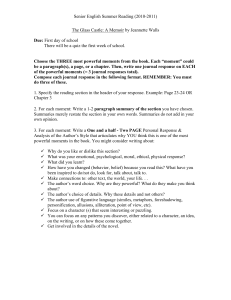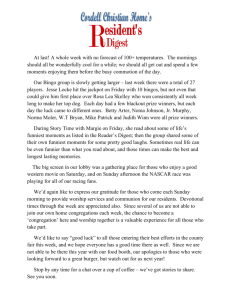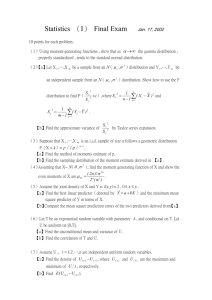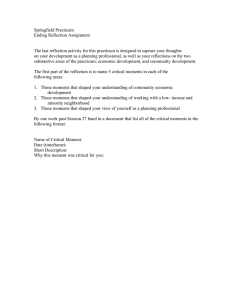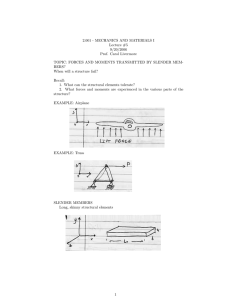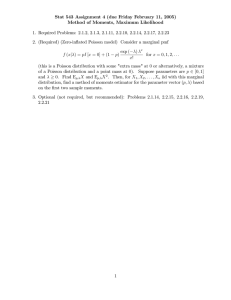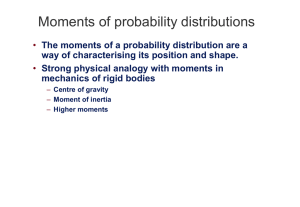11.965, Reflective Practice, Or, How to Give Global Relevance to... Caesar McDowell, Claudia Canepa, and Sebastiao Ferreira
advertisement
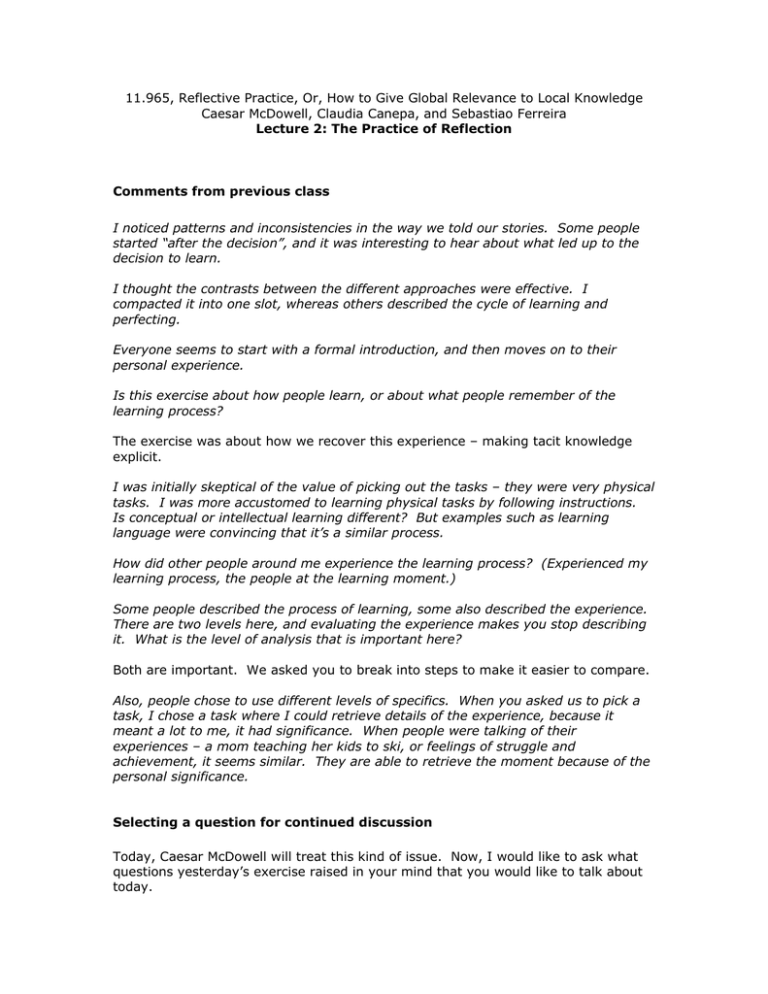
11.965, Reflective Practice, Or, How to Give Global Relevance to Local Knowledge Caesar McDowell, Claudia Canepa, and Sebastiao Ferreira Lecture 2: The Practice of Reflection Comments from previous class I noticed patterns and inconsistencies in the way we told our stories. Some people started “after the decision”, and it was interesting to hear about what led up to the decision to learn. I thought the contrasts between the different approaches were effective. I compacted it into one slot, whereas others described the cycle of learning and perfecting. Everyone seems to start with a formal introduction, and then moves on to their personal experience. Is this exercise about how people learn, or about what people remember of the learning process? The exercise was about how we recover this experience – making tacit knowledge explicit. I was initially skeptical of the value of picking out the tasks – they were very physical tasks. I was more accustomed to learning physical tasks by following instructions. Is conceptual or intellectual learning different? But examples such as learning language were convincing that it’s a similar process. How did other people around me experience the learning process? (Experienced my learning process, the people at the learning moment.) Some people described the process of learning, some also described the experience. There are two levels here, and evaluating the experience makes you stop describing it. What is the level of analysis that is important here? Both are important. We asked you to break into steps to make it easier to compare. Also, people chose to use different levels of specifics. When you asked us to pick a task, I chose a task where I could retrieve details of the experience, because it meant a lot to me, it had significance. When people were talking of their experiences – a mom teaching her kids to ski, or feelings of struggle and achievement, it seems similar. They are able to retrieve the moment because of the personal significance. Selecting a question for continued discussion Today, Caesar McDowell will treat this kind of issue. Now, I would like to ask what questions yesterday’s exercise raised in your mind that you would like to talk about today. That was my memory of the experience, but I wasn’t sure if that was accurate. Was my memory authentic, or close to authentic? I think the question of authenticity is kind of irrelevant. It seems like the important part is the cognition of the event – the purpose is not to get an accurate rendition, but which moments you remember, and how you remember them, and why. Perhaps objective remembering isn’t the point here. What are the effects that expressing learning through a graphic can have on our experiences? If I need to write about it, or talk about it, how is that different? [from the flow chart students were asked to draw yesterday] One of the readings mentioned that when you are helping someone understand their own cognitive learning, asking them to teach someone else helps them structure the concepts. Yesterday, then, why did we do it on our own rather than explaining it to someone else? [continuing] If you don’t know how to reflect, then explaining it helps you organize your ideas and concepts, and understand it yourself. But yesterday we approached it by doing it ourselves. Why did you choose to do it that way? I feel like it gets back to the same question as earlier. If you’re trying to teach someone to ski, you want to actually be on a ski slope. But if you’re trying to remember the experience of learning to ski, you don’t need to be. One thing I used to do with communities and organizations – how do you move from this level of reflective practice to a level where you can actually develop directions? More of the level of looking at the broader things and pull experiences together and decide on an institutional direction. How do you reach that holistic sense? I would like you to select one question, by vote. What do you consider most interesting for continued discussion today? The two chosen questions: 1) Which elements do we remember and why? 2) How do we move from a simple level of learning to a complex one? Caesar McDowell – introduction to critical moments Critical moments methodology. Why do we do this and where did it come from? Came out of looking in communities – people who live and work in a place together and try to improve their conditions over time. Poor communities, marginalized communities, folks trying to improve their lives collectively in a situation where they’re not well represented. One of the things that happens in communities – how do people hold on to their collective experiences? Communities will adopt a representation of themselves that isn’t the truth. Civil rights movement: the good scholarship didn’t start to happen until the late 1980’s. It gets portrayed as a story about a couple of extraordinary people who 11.965, Reflective Practice McDowell, Canepa, and Ferreira Lecture 2 Page 2 of 9 organized a mass of people and called a nation to its moral obligation. That “great person” framing became what the community adopted. We can see how that became a framing concept – people saying we don’t have the right leadership. But if you go back and look at the work and talk to people on the ground, you find that those leaders were not the movement. The efforts had started decades before that, and made it possible for certain moments to happen. The two stories – great leaders helping people, or efforts of lots of people on the ground – tell very different stories about people and a community. What happens when people have an experience together? No one in an experience holds the truth of it. We all have a piece of the group experience. I can tell my story of what it was like for me, everyone else can do the same thing. How to take a set of people and help them reconstruct an experience to identify what they think is important? How can our past help us accomplish what we want in the future? This practice is organized around inquiry questions. We believe that people are driven by questions – something they’re trying to figure out. The first thing is getting people to name questions in their work. Imagine that we have 20 people here from a small town in Mississippi. Think of a question that, if you knew the answer, would significantly change how you move forward in your work. We have everyone in the room generate those questions, have the whole group look at the questions they’re holding as a group. We didn’t know these were the things we were struggling with. People are always negotiating how much of the individual experience to bring into the collective experience. Most of our group processes try to move toward the mean, finding what’s most common. But what’s most common might not be what’s most important. But if you start with the individual and have every individual name what’s true for them, you get outliers and complexity. One question. There might be new ways to frame what we’ve experienced in the past. How do we bring that into the future? When you open up this process, you’re not framing, you’re asking people what’s true for them. How do you open people up to different frames? It’s one of the key parts of facilitating. Given that the experience and knowledge is limited to a particular group, how do you bring outside experience in? What if, in the civil rights movement, what we really need is an economic analysis? Incorporating outside knowledge is sort of a separate point, and not the question we’re focusing on. What if the problem is the framing of slavery, or the Civil War – something in the past? It seems like it’s related, because the way people see that past experience affects how they see current experience and their future work. I’m interested in how the reflective process helps people let go of these former identities. 11.965, Reflective Practice McDowell, Canepa, and Ferreira Lecture 2 Page 3 of 9 Participant Exercise This group has one shared experience, of yesterday. Name for yourself the most critical moments of the day. Events, opportunities, insights that made a difference in how you engaged in or thought about what was going on. They can be positive, negative, or neutral. Sometimes you have things that are negative at the time, and you can go back and make into a positive. We want you to stay with how it was at the time. List as many of these as you can. Description On a small piece of paper (one for each critical moment): Name of critical moment / positive, negative, or neutral / your name / time Time is relative to a time line on the board, where 0 is before class starts and 7 is after class ends. The rest of the time line is as follows: 1) 2) 3) 4) 5) 6) overview presentation break exercise (individual) exercise presentation closure The students are asked to place their sheets on the board – positive moments above the timeline, negative below. General perception: many sheets above the line, with some concentration during the exercise (both individual and presentation). There are fewer sheets below the line, heavily concentrated during the individual exercise. General Comments Nothing happened afterwards, even in the closure. Well, we didn’t get to that part. The individual exercise seemed to stick out for people. There are not a lot of neutral critical moments. It’s hard to say what is neutral, for me. Especially when you’re talking about critical. Each student describes their critical moments. I saw the sign for the class, “oh wait, I haven’t missed it!” Rethinking my work: I introduced myself and then wondered, is that how I should be introducing myself? 11.965, Reflective Practice McDowell, Canepa, and Ferreira Lecture 2 Page 4 of 9 The framing of both what I do and the actual doing, mostly positive. Thinking about how I wrote up my particular learned skill – in between doing and talking about it, and it was an event I had done reflection on (learning a language), I realized how much psychological affect played into how I remembered it. Anticipation before the class, what my role would be. Frustration related to the individual exercise, coming up with something I could relate. After everyone had presented, I realized how I would have done mine differently. When I entered the class and saw a very diverse group age-wise, that was good. Then during the presentation, when she talked about skiing, I realized I can still learn such things even in my mid-30s rather than be crippled by fear. Then at lunch some people were talking about Dumpster diving and I was surprised that happens in the US – I’m learning how things are here. It was really interesting how we had the same task, but everyone had a different way of thinking about it and approaching it. We started to talk together and among each other. Talking about our experiences in simple matters, reflecting, everyone had their own perspective from different fields. I’ve always been active in supporting knowledge networks and institutions. Claudia and I went together to Peru – I put this as a negative to neutral, it was controversial. My efforts were to get solid knowledge deliverables, and the idea of having a community practice that didn’t deliver anything had us going crazy. Claudia thought I should come up here and understand methodology a little better. I’m curious to see how this all works out. Then Sebastiao came to the rescue and gave a conference in Peru that perked me up. Then I was perked up again by today’s reflection, it got me motivated. My first critical moment was organizing the ideas for my presentation. It was hard but a good experience. I think it’s hard to choose something that meant something to people who were listening. It was interesting to see how different people had different ways of looking at their experiences. The first negative part was thinking of a learning experience, that was kind of difficult. When I actually did think of something, that was positive. The presentation was neutral as a listener, a chance to see the experiences of others. I don’t want excessive expectations to ruin my experience of what actually happened. The presentation of the syllabus, discussing the content of the course and what the reflective process was about, I had a good feeling about this. During break I had the chance to talk to a friend, and my intuition was right about what was going on. I’m skeptical about group exercises so I was trying to hold myself, then I realized how diverse everyone’s learning process was. Sometimes you think something will be simple and flat, then it isn’t at all. My sense of relief at already knowing people here, realizing it was a good working group. The room was really cold – that was really distracting. Getting a sense of the course and understanding the goals, that lessened my anxiety. The perpetual sense that my chart was wrong and that everyone perceives the directions differently than I do. Lunch with a fellow at the Center, every time I feel like I’m foundering on this 11.965, Reflective Practice McDowell, Canepa, and Ferreira Lecture 2 Page 5 of 9 project I talk with her – it’s not all cerebral, there’s a tangible thing and a deliverable and a goal. During the exercise, one of my aha moments was about realizing that reaching the top (in rock climbing) was not what I was trying to learn, but rather the process. Observations Those are not disparate – you could divide them into a very narrow series of categories. A few themes that are well represented. Why is the concentration of negative response around being asked to think about something memorable and process it? Some people were frustrated because they felt they weren’t doing it right, not because it was a cognitive / intellectual thing. You don’t really know each other, so in front of a group, all sorts of things get triggered. In situations where people already know each other, the negatives are all about things that actually happened. In some sense the negatives around the individual exercise are an artifact of the fact that this group was new to each other. Similarly, it seems like all these critical moments are very individual. Is that due to the fact that we don’t know each other yet? I just did this exercise with people who had worked in a three-year experience in Mississippi. Yet when you do this exercise in that situation, the critical moments are still very individual. Still, it plays out differently when you do this with people who have worked together over time. It focuses on things that happened in the work together, yet you still get very personal things, like someone deciding to get married – that has impact on the work going forward. Having done this exercise at CARE, it’s the same experience of looking at how the critical moments cluster. You have the same feelings, though you didn’t realize it at the time. It’s a kind of solidarity. Again, what we’re trying to do is map out all the different perspectives people have. In other situations, where people have been working together for months or years, it is a very detailed map. People are astounded, looking at the time line afterwards. Everyone doesn’t see the little pieces, how complex the work is. The complexity gives them a sense there really is something going on here. It starts them thinking about: what do we know? Discussion of Questions (identified earlier in class) Now we ask people to look at the critical moments and say, if I knew more about this critical moment, would it help me to answer this question? Is there anything where, if you understood it more deeply, it would address either of these questions? Take that piece of paper and put it under the question. Not that it is the answer, but it might help give us information about how to answer. 11.965, Reflective Practice McDowell, Canepa, and Ferreira Lecture 2 Page 6 of 9 Example from another group: How can we build stronger multicultural connections without losing our own identity? We identify the moments that are most important. But that’s still not an answer, just a pointer. Who do we need to be in this room to get the proper learning and perspective? Take a critical moment, find the set of people, then we do the structured process of telling the story. Get people to lay out what is the terrain of the experience. Have people do their own analysis of the experience. What do they think the implications are? Then that group comes back to the larger group and presents the details, analysis, implications for answering the questions. The larger group pushes them on their analysis, whether it is accurate. The last step: so, what difference do we think this will make in our work? What will we do differently over the next 3-6 months or the next year based on this? The timeline becomes valuable historical information, something the group doesn’t already have. Does this work most effectively when you focus the exercise around a single experience? People come to the table with a lot of different experiences. How to group it so it becomes meaningful and useful to everyone in the group? This method is all about working with the experience. If you weren’t in it, you’d just generate a lot of noise. Everything needs to be tied to a concrete experience. [15-minute break] The following section is led by Sebastiao Ferreira. We know best the experiences which we have lived directly. We know that it’s subjective, because it’s how I felt during the experience. The problem of the subjective approach will be changed somewhat when we construct the complete experience. We can imagine a line passing through each of the critical moments that is our personal experience, and the sum of all the threads is the complete experience. The parts that were more meaningful for me, I have more knowledge about. When I can see the sum of experiences from everyone, I can have broader perspective – different conditions, different forms of understanding. It enables me to go beyond my personal perspective. So the methodology starts with your personal perspective, but provides a way to go beyond it. The results of this reflection can be impacted by external factors [he draws arrows toward the time line]. We can compare the experience we lived with the environment it involved in. We can look at the interaction between environment and experience. An organization in Peru dedicated to education – they are very enthusiastic about democracy in Peru, lots of expectations for the new government. After a couple years the critical moments started becoming negative, but it wasn’t anything happening within the group, but rather government policies that affected their work and enthusiasm. Difference between internal perspective and external complexities. 11.965, Reflective Practice McDowell, Canepa, and Ferreira Lecture 2 Page 7 of 9 When you draw the line, is it different for every person, or is there one for the group? One for each person – everyone’s experience is different. One thing to explain: why critical moments? Psychologists found that if this is a critical moment, I have in my memory a lot around the critical moment, so this is a good way to reconstruct my experience. Critical moments should be personal, because the information I have is organized around things that are meaningful for me. I have a meaning here that illuminates this area in my memory. So you would actually have ten or fifteen timelines? One timeline for each person? And that would help you understand the whole process, and you sort of blend all the timelines to get all the components? And then you see process more clearly. So that’s where you would take into account other people’s critical moments? Then you don’t lose that aha moment. How do you know those critical moments are representative of the sense you had during that time? It would show that I went from feeling really good about a project, to not really good… But is that really giving you a clear picture of your sense of the project over time, given that you don’t really reconstruct what’s going on in between the critical moments? The idea of the line is just to give you a figure. Indeed we don’t know what happens between one critical moment and the next. But the thing is, we always work with incomplete information – here we are aware of that. When we see all the critical moments, our mind tries to figure out some meaning for the combination. Here we put up the stages beforehand, but usually you just put up the dates and see what comes out. In our professional work, we need to step back a lot and try to understand. People who are used to this kind of reflection can learn faster from their experiences. Two interesting things were happening as you explained your experiences. One was that each participant was much more clear when explaining to others, compared to describing for oneself. The other is that the experiences were very different and interesting. How much do the lines for each individual in a community differ from each other? I expect little difference, and expect the critical moments for each person to be similar, because there is an ongoing issue. I expect the critical moments to almost match to each other. Sebastiao: It depends on the group. If you have two parts of the group from different social conditions, they will each see the experience from their perspective. For example, the peasants and the people who distribute land to the peasants, they have very different perspectives. Meeting with both groups was very interesting. They described very different moments. Yet at the end they reached agreements about some conclusions – they found some common meaning, though they had lived the experiences very differently. For example, the same moment may be perceived positively by one group and negatively by another. You can do a lot of analysis from the information you get from the sum of critical moments. 11.965, Reflective Practice McDowell, Canepa, and Ferreira Lecture 2 Page 8 of 9 Caesar: The difference in perspectives is really important. The broader the range of critical moments, the better you are able to do analysis. When you talk to young couples and old couples… old couples sort of jump into the story because they’re telling the same story. Is this about constructing a group history so it becomes the official way of everyone looking at the experience? Wouldn’t that be dangerous? Caesar: The difficult, but good thing, is that it’s a story that’s never settled. They can agree to disagree. For me, that’s what we are trying to get to – the reality is that there isn’t one truth, one story. You’re hoping for people outside the community to understand that it is complex. At the same time, seeking clarity about where you’re going next. Communities spend a lot of time hiding from themselves. Part of this is about getting to the truth. Can you be a little more specific about the question of who you’re talking to at once? For instance, the extremes of grass-roots organizations and policymakers – can they be part of the same group? Caesar: One of the things you’re weighing in the spectrum – people who haven’t had the chance to share their experience with the world need to have that chance honored. One way to do that is to, say, ask the policymakers to speak only from their experiences. It’s the abstractions that are really the problem. The issue is really holding the frame, making everyone stay in that frame. Claudia: We haven’t talked too much about the role of the facilitator in this process. Should we talk about that now? Caesar: Facilitating reflective process is very different – facilitator’s role is to support each person and to push each person’s internal reflection, then help the group extract the essence of the experience. You have to give yourself over to believing that everyone has valuable knowledge and experience, and the job is about helping people find that in themselves. Documenting everything is also important, so people can go back and look at it. What we’re trying to do is build knowledge processes for communities, help people connect what they know instinctively and put it in a form that can be shared with others. If there are things people agree and disagree about, what are the implications for communities that contain both the aggrieved and the aggressor? Caesar: There’s a Truth and Reconciliation program in Greensboro – maybe sometime I can bring that up and talk about that in more detail. Sebastiao: tomorrow we’ll be working on knowledge generation, making tacit knowledge explicit. “Learning after Doing”, a series of videos used by the US Army to reflect on actions, is available in the Rotch library. 11.965, Reflective Practice McDowell, Canepa, and Ferreira Lecture 2 Page 9 of 9
